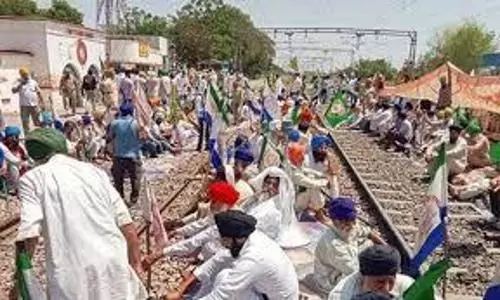
Contempt of court and media freedom
text_fieldsThe conempt of court case against the paper 'Shillong Times' has been stayed by the Supreme Court The editor of te paper Patricia Mukhim and publisher Shobha Chaudhuri were found guilty of contempt by Meghalaya High Court. The division bench of the court comprising Chief Justice Mohammed Yaqoob Mir and Justice Sudip Ranjan Sen slapped fines of Rs 2 lakhs each on the two accused and asked them to sit in a corner of the court room till the court rose.
The court, which decreed that failing to pay the fine, the guilty will have to spend six months in jail, also added in a rather angry tone that the paper would also thus come to an end. Newspapers and Editors' Guild have come out against the court order. And Meghalaya People's Committee for Freedom of Expression had raised funds for the appeal in Supreme Court throuh a crowd funding initiatve.
The Supreme Court which stayed the high court verdict has also issued a notice to the High Court Registry. The original case was against two reports which were seen as targeted against Justice Sudip Sen who retired soon after issuing the verdict. The state government had withdrawn the benefits previously existing for retired judges. When Justice Sudip Sen ordered the restoration of those benefits, the paper in its report had specifically mentioned that he was going to retire.
The heading of an analytical report was 'When judges judge for themselves'. In addition to this, certain social media posts by editor Patricia Mukhim were also declared by the court as constituting contempt. Although both tendered unconditional apology, the court judged them as only a tactic to evade punishment and proceeded to impose the fine.
The high court verdict raises several questions about contempt of court and press freedom. Anything that destroys the impartiality and credibility of the court cannot be allowed. Comments that threaten the existence of the very institution of judiciary is constitutionally unacceptable too. In this matter, judges themselves bear some responsibility.
An example is Justice Sudip Sen, who charged a suo motu case against the mediapersons, himself getting embroiled in an unpleasant controversy earlier. One of his verdicts which had come in for widespread criticism, had requested prime minister Modi to declare that Hindus, Sikhs, Jains, Budhists, Parsis, Christians, Khasis, Jaintias, and Garos who cross over to India from Afghanistan, Pakistan and Banglaesh would become Indian citizens. The freedom to criticise and question anything unacceptable is also a constitutional tenet.
The question as to how relevant to 'Shillon Times' case the contempt law is, has already been raised. Criticising the court is not prohibited, and anything that is said will become contempt only when it is incorrect and with mala fide intent. What can be seen in the reports of 'Shillong Times' are not factual errors but the impropriety in tone. Many jurists are of the opinion that the case could have been settled by accepting the apology. Anywhow now that the Supreme Court has accepted the case for consideration, the course is to await its decision.
The threats that have been raised of late against media freedom need to be highlighted. The central government has started raising its sword against the Hindu newspaper for having published documents showing the faillins of the government in connection with the Rafale deal.
It is a fundamental pre-requisite of media freedom that there shall be no compulsion to disclose the source of news. When many countries offer legal protection to 'whistle blowers' who uncover corruption, here the attempt is to file case on the charge that a news report is a copy of official document. And the recent denial of government advertisements to two English newspapers of Kashmir should also be seen as part of such moves.
The case of 'Shillong Times' too is of crucial importance in the matter of media freedm. A balanced position maintaining the credibility and prestige of the judiciary together with the freedom of expression including that of the press, would be in consonance with our democracy and constitution.























